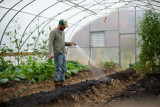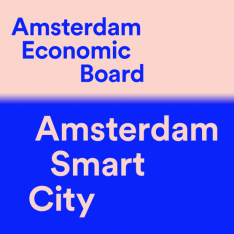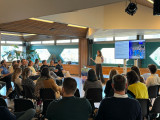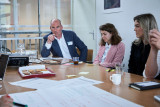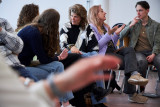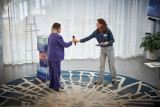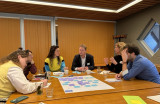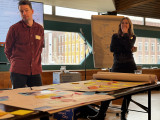On Thursday, March 7th, Amsterdam Smart City partners gathered for a day full of inspiration, exchange and connection with each other at our Transition Day! In this article, we give you a quick overview of the challenges we discussed, the inspiration session and the crash course drawing. Interesting in learning more? Read the challenge descriptions by our Program Managers Noor and Pelle (linked below).
About our Transition Days
Our yearly Transition Day is the day on which we investigate together with the network where we can make the most impact this year. Last year on, we mainly looked at the underlying barriers to the (then) surprising challenges and results. These challenges, such as mobility justice and human digitalization, are now completed or handed over. That is why this Transition Day we started working on new challenges. We started working on transition tasks that can only be advanced by working together, where we as a network can make a difference. Together with our knowledge partners and the challenge submitters from our network, we put together the 2024 full day program.
The Underground Challenge
In this session, we dived into the world of underground infrastructure. Many different stakeholders deal with the underground. Electricity cables, fibre optic cables, gas pipelines, heat networks, sewers, but also tree roots and soil, form a complex playing field with many different interests for the parties involved. Right now, collaboration, data sharing, and co-planning between these parties is sub-optimal. Therefore, we started the challenge: Understanding the underground: Collaborating, Sharing Data, and Co-Planning. You can find all the information on the challenge here.
Would you like to join this challenge? Please get in touch with Noor at noor@amsterdamsmartcity.com.
The Cooperative Challenge
In the past decade, we have witnessed a surge of cooperatives across society. This is great because cooperative initiatives can help drive sustainability and social goals. However, these initiatives always remain small-scale and localized and, in most cases, accessible only to specific and select demographics. In this session, we discussed the barriers to making cooperatives more mainstream. We decided to focus on the energy domain and defined the following question: How can we help to mainstream energy cooperatives and ensure that structures in society make room for them and barriers are resolved?
You can find all the information on this challenge here. Would you like to join this challenge? Please get in touch with Noor at noor@amsterdamsmartcity.com.
The Floating Urban Development Challenge
Due to lack of space and climate change, the future of living might need to partly move on to water areas. Researchers and designers are therefore imagining and conceptualizing floating urban development. However, to make it a truly realistic and imaginable future scenario, there are more hurdles to overcome. This challenge aims to change our collective belief in a way that living on water becomes as a serious option conceivable for everyone. We’ll work on creating imaginable and workable scenarios of urban development on water.
You can find all the information on this challenge here. Would you like to join this challenge? Please get in touch with Pelle at pelle@amsterdamsmartcity.com.
The Circular challenge
Circular initiatives often struggle to progress beyond the pilot phase. Numerous barriers hinder these circular initiatives, such as lack of data, implementation across the entire production chain, regulatory obstacles, and higher costs.
To overcome these barriers, adjustments to regulations are necessary to better align with circular initiatives, alongside the establishment of shared ownership within the production chain. For this challenge, we decided to focus on Electric Vehicle Charging Infrastructure. You can find all the information on this challenge here.
Would you like to join this challenge? Please get in touch with Noor at noor@amsterdamsmartcity.com.
Inspiration session: Collaborating and building Coalitions – Renée Schoonbeek | Arcadis
Renée Schoonbeek (Arcadis) kicked off the afternoon program with an inspiring session about the dynamics of successful collaboration. She shared two area development projects, one a success and one a failure. The collaboration success was the story of Hudson Square, New York. They successfully managed to get more green into the city, better facilities for bicycles and pedestrians, and renovated a public park. The keys to success were a grassroots initiative, clear goals, and a diverse coalition representing everyone from real estate to residents.
In contrast, the collaboration for the development of Feyenoord's stadium failed due to leadership changes, shifting market conditions, and lack of long-term commitment. Important lessons that emerged from this failure were to continuously focus on collaboration, avoid false consensus, invest in long-term commitment, and be vigilant towards signals of dissent within the collaborating parties.
Renée finished the session with an exercise. The most important thing in collaboration is to properly listen and ask questions. We practised asking questions with the technique “2 down, 1 to the side”. Where you first ask three questions. The 1st question is a rational question (what, who, where, why)? The 2nd question is a follow-up question, again a rational question for clarification or deepening. The 3rd question is an emotional question (how does that feel, how do you look back on it, what have you learned from it?). This exercise helped us to see things from the other person's perspective.
Renée’s key takeaway for reaching consensus in collaborations was to not only look at what you need from another person but also to see what you can offer. With this information in our back pocket, we were ready to start forming our own coalitions.
Crash course drawing – Thomas van Daalen | Flatland agency
From lines to inspiring discussion diagrams. Flatland Agency introduced us to the world of 'Visual Storytelling'. How can you support a story with drawings, or visually represent a summary of a brainstorming session? Thomas from Flatland gave us a masterclass in drawing, demonstrating how simple shapes can say a lot.
We concluded this inspiring day with drinks and also said goodbye to Leonie as program director. With tears and laughter, we thanked her for all her efforts and dedication and wished her all the best for her further recovery.
We would like to give special thanks to everyone that helped organize this Transition Day. Many thanks to RoyalHaskoning, Flatland, Hieroo, Drift and HvA, all contributors to the challenges and all those present!
Our next event (knowledge- and Demoday) is on the 18th of April. Would you like to participate in this Demoday, or learn more about the program? Please reach out to pelle@amsterdamsmartcity.com.
